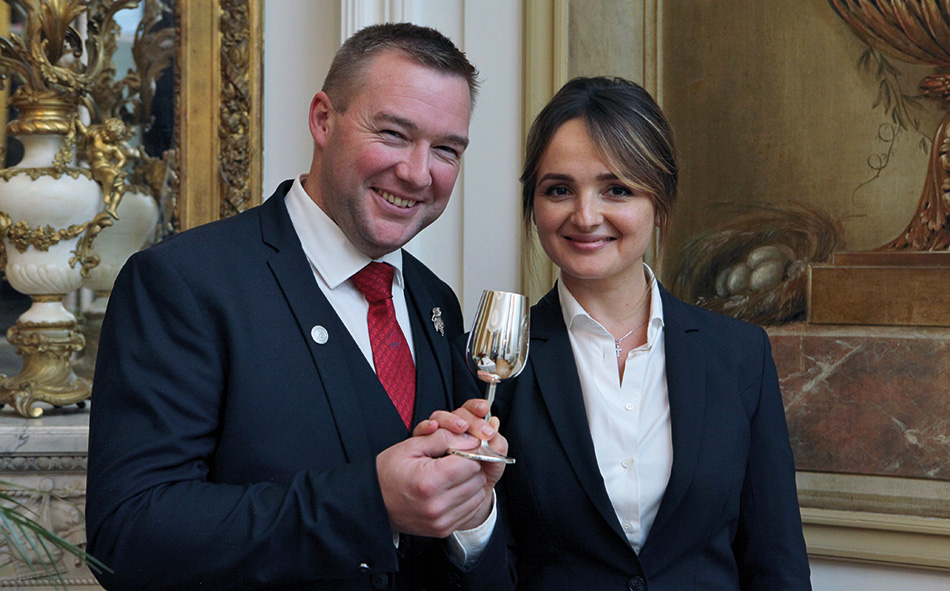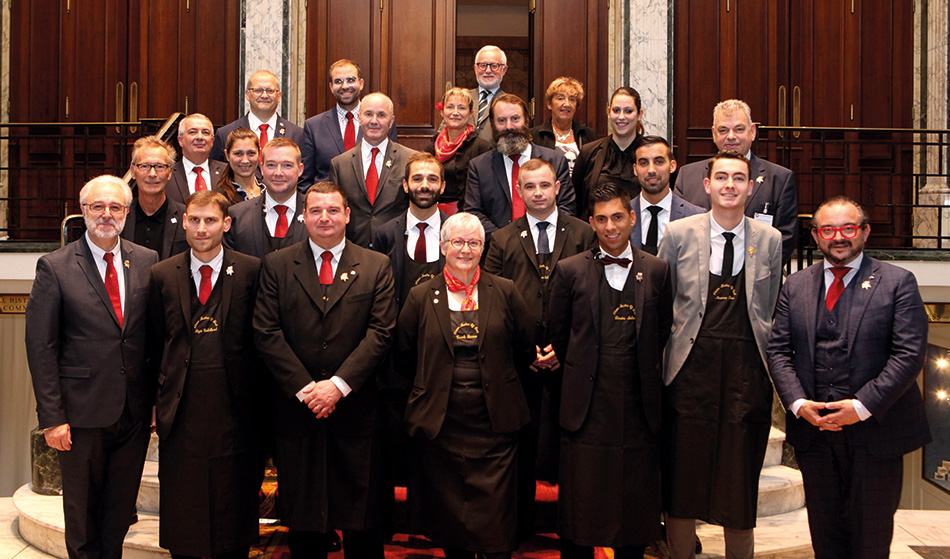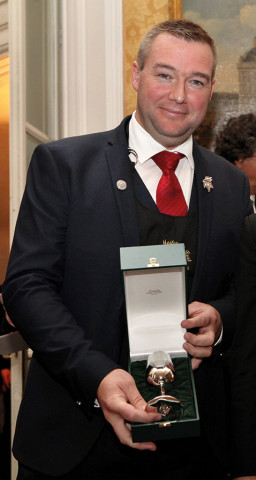The three most experienced sommeliers, Gaëtan Bouvier, Micael Morais and Yann Satin, were gathered to compete in the final round of events. And so it was the Best Sommelier of France 2016 who won the competition.

A competition, whatever its environment, can only end on a happy note. Of course, there are the smiles of the winner, but there is also the disappointment and sometimes the tears of the defeated. Finally there is also emotion.
And it is with this emotion, expressed by those who have very often made candidates suffer as a result of increasingly complex and unpredictable tests, that we should perhaps begin to mention for this 18th edition of the Master of Port. Because without these creators of workshops and questionnaires there would be no competition... Fabrice Sommier and Antoine Woerlé have therefore chosen to say goodbye in Portugal, as the decor of the Portuguese Embassy gives an even more official character to their farewells. After several years of close collaboration, they will give way to other UDSF members who have already found their bearings, such as Bertrand Bijasson, the new head of the Master of Port.
From this last meeting, the two pillars of the technical committee will keep the memory of a final as exciting as high leveled in terms of the quality of the competitors. A three-way final, which will become the standard for all competitions organised by UDSF, which brought together Gaëtan Bouvier, Micael Morais and Yann Satin. Everyone was already aware of the tension that accompanies this last stage with the presence of a very large audience this year and events whose level of difficulty should make it possible to make a difference.
But before they were three, nine of them were expecting a lot from the Parisian reunion in October. Selected at the end of April, the regulars of this competition, which celebrates the wines of Port and Douro Valley (Carole Ferron, Régis Gabillard) as well as neophytes (Mattia Angius, Bastien Debono, Dimitri Nalin and Maxime Resse) expressed their qualities and undoubtedly also measured the efforts still to be made during the semi-final. Especially the newcomers who have taken advantage of this opportunity to establish themselves and thus already look forward to the 2021 edition.
Very complete written tests (slide show, food and wine pairing, geographical location of famous quintas, map correction, questionnaire) preceded two practical workshops. Not to mention the creation of cocktails which, if not included in the Master of Port points count, allowed Maxime Resse to win the prize with his drink called ‘Douro Pink Cocktail’.
A trio then broke away, almost without surprise. Gaëtan Bouvier and Yann Satin were going to play in their third final and Micael Morais in his second. On stage, the commented tasting of a Port wine, a 1985 colheita from Cruz, set the tone, followed by an exercise to classify four wines by sugar levels.

Then, in front of the audience, each candidate had 18 minutes to complete a set of operations. The most delicate, the opening of a bottle of Porto 2003 from the Andresen company with tongs, should not hide the fact that it was also necessary to meet the expectations of restaurant customers. In particular, to offer wines in harmony with the dishes of a meal that pays tribute to Portuguese gastronomy. The special feature was that each finalist could compose a menu proposal as he or she wished, provided that the number of dishes desired was respected. And just to disturb the finalists a little, a British citizen was among the candidates.
Once opened with the tongs brought to a very high temperature and then iced to cause a thermal shock by separating the part near the neck from the rest of the bottle, the bottle had to be poured into a decanter using a filter. Finally, the candidate should not forget to cover the two projecting glass parts with wax to avoid any risk of cutting afterwards.
A final series of questions concluded these tests before the beginning of a long waiting time. Because it was only when they met at the embassy and after a first tasting marked by the presence of a large number of Port houses, that the result of the competition was announced. Gaëtan Bouvier succeeds Julia Scavo who officially handed over her trophy.
A long day that ended with a series of inductions into the Port brotherhood, a first outside the Portuguese borders, with Julia Scavo and Philippe Faure-Brac elevated to the rank of Infançãos. Just before, Antoine Woerlé had received the title of Master of Port honoris causa.
Jean Bernard
Three years after winning the title of Best Sommelier of France and after two consecutive failures in the Master of Port final, Gaëtan Bouvier has found his way back to success. Encouraged by Natalia, his wife, he could perhaps now try to be selected for an international competition ...

What does the Master of Port represent for you?
First of all it is a time of meetings and exchanges with other candidates who share the same passion and with all the players in the world of Port. That is why I like to participate and why I played in my third final. This one is successful and rewards my perseverance throughout these years with regular trips to the Douro Valley and numerous tastings.
What place do you give to Port wines?
The first time I had the opportunity to taste some was at the Grenoble hotel school. But it was after my training, when I worked in different starred restaurants, that I really started working with this wine. Especially in contact with Davy Tissot, the chef, Best Craftsman of France, who will represent France at the next Bocuse d’Or competition. Today we met at the Paul Bocuse Institute and together we are committed to using Port wines at the table and bringing them into contact with the ingredients that make up gourmet dishes. In fact, we tested a piring with the dish with rabbit that enabled my Chef to qualify and the result was superb.
Which type of Port wine do you prefer?
I like the style of the colheitas but thanks to the Master of Port, by studying and tasting them, I discovered the world of the vintage Ports and the more it goes, the more I orient myself towards this range. I find that great vintage Ports, when you get to the game period, allow beautiful combinations. In particular a great classic, the hare à la royale, a dish that came out in the final of the competition for the Best Sommelier of France 2018, goes very well with a 2007 vintage Port that is still very very young or by going much further back in time. At Nieport, the 1970s vintage Port are extraordinary ...
What will you remember from your victorious final?
A workshop seduced me in the semi-final. It was the one where two Port wines had to be identified among six fortified wines from Portugal such as Muscatel de Sétubal or another added with quinine. Surprising wines that disturb when tasted blind.
In the finals, I enjoyed the blind tasting of a 1985 colheita from Cruz. This was the first workshop and it is always the time when you get a little adrenaline rush when you go on stage. Then you can feel if you’re going to be in it or not! For my part, this wine gave me a lot of emotion and chills and I had difficulty channelling myself, staying focused. And then there was also the opening of a bottle with tongs, which I have been doing for the past ten years in the different restaurants where I have been. It is a beautiful staging of Port wine.
Interview by Jean Bernard